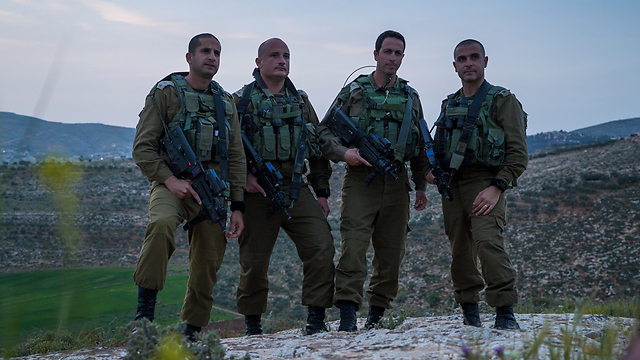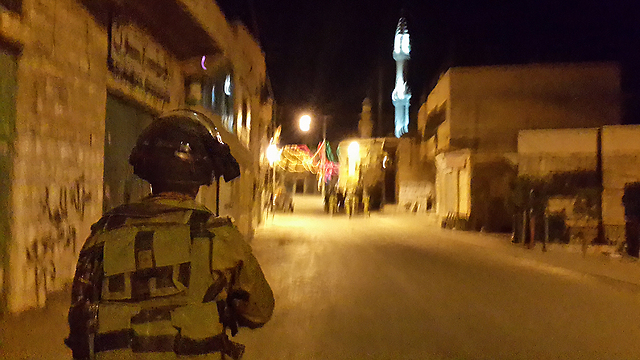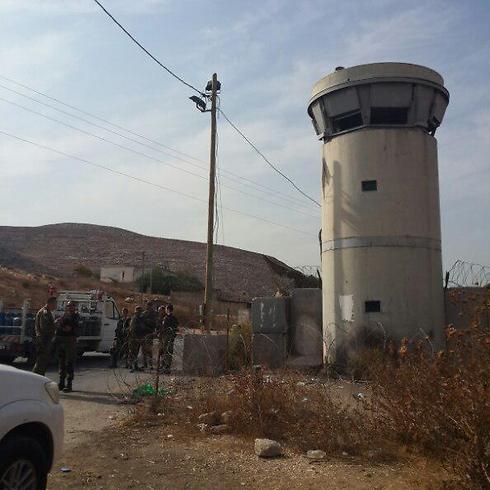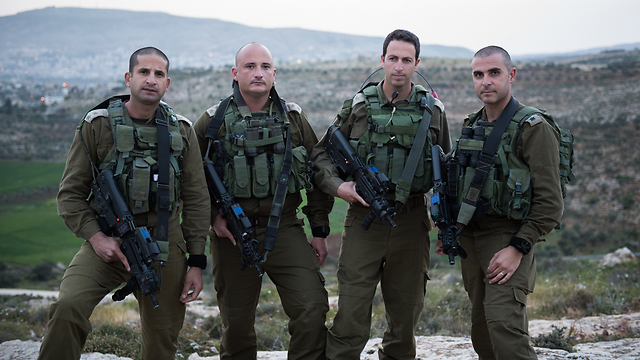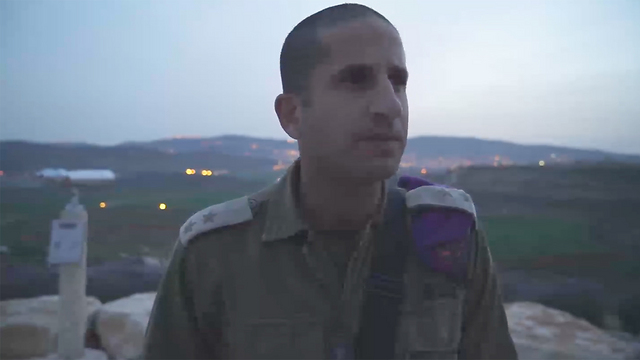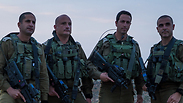
"This wave of terror isn't really behind us. The explosion on the bus in Jerusalem took us all back to the beginning of the 2000s.”
Klapper, 40, is not alone is his evaluation. His five colleagues, also senior commanders of West Bank battalions, hold similar views. “Many measures are being undertaken at different levels, and that is what's bringing the quiet.”
Samaria commander Col. Yariv Ben-Ezra, 40 said, “The number has significantly decreased, but only for now.”
Undoubtedly, while Hamas is continuously digging tunnels in the south, and Hezbollah has been rearming for years in the north, the most intense area for the IDF over the past few months has been in the West Bank, which large security forces and personnel resources have been forced to address.
Only the relative calm in recent weeks (five attacks since the beginning of April compared with 72 in October, 47 in November, 42 in December, 21 in January, 20 in February and 23 in March) enabled us to meet with the six busiest battalion commanders in the IDF. For several hours they discussed almost everything pertaining to the wave of terrorism: they provided explanations for its sharp decline , shared the methods which were formulated to cope with it, and spoke candidly about the most sensitive issues such as Elor Azaria, who shot dead a neutralized terrorist who had carried out a stabbing attack in Hebron.
In October 2015, with the murder of the Henkin family, which ignited the current wave of terror, security forces broadcasted an almost helpless message. “This is a lone attack,” the security officials claimed. “We have no way of preventing a Palestinian who works in a Tel Aviv building from suddenly taking a screwdriver and stabbing people in the street because of something they read that morning on Facebook.”
“Very quickly at the outset of the violence, we understood that we were facing a different kind of threat.” explained Col. Roman Gofma, 39, commander of the Etzion battalion.
“The lone terrorist is basically everything. They're the planner, the supplier of their own weapons, and the one who carries out the attack. They don’t need directives, infrastructure or intelligence. Even the weaponry which they use is the simplest there is, as simple as a vehicle used for a car-ramming attack."
"We began defining the problem," the colonel continued. "Until then, this problem didn't exist, and if it did, it was only on the margins. However, it became a critical threat the moment that we officially labeled them as ‘lone-wolf attackers.'”
How can an attacker be prevented from carrying out an attack?
Gofman: “We began to analyze and build an 'attacker profile' according to the attack that they carried out. Where did they come from? What age were they? What motivated them? With these criteria, we began implementing comprehensive and focused action. We realized, for instance, that between 50 and 60 per cent of the attacks were not the first instances of friction between the attackers and the security forces.
"Many of the attackers, such as the murderer of Hadar Bukris, were people who had engaged in rock throwing. Most of them had been arrested in the past. The majority had been stopped for illegally staying in Israel. We began to check the list of people whom we had arrested and created a list of dangerous groups comprising young people between the ages of 15 and 25. We searched people of this age group who were previously arrested for rock-throwing incidents, for being in Israel illegally or for disruption of public order and we began checking their Facebook pages.”
And when you locate them?
“We started to target them directly. We compiled a list of around 100–150 such people who matched our criteria in every village; in Beit Ummar or in Beit Fajjar, for example. Those that we could arrest, we arrested. For those who we had no reason to arrest, we warned, and for others we mapped their homes—every night we went to their houses and searched them. We also exerted pressure on their families. We made it clear that if their child involves themselves in terror, the equipment they used to provide for themselves—be it farming equipment or engineering tools—would be confiscated."
"When we carry out these measures without stopping, every night, it has an effect," the colonel says, continuing, "It also affects those whom we haven't visited yet. The statistics began to illustrate a decline.”
“The number of comprehensive measures done during the last few months is astonishing.” says Col. Israel Shomer, 38, from the Binyamin brigade.
“I personally, every night and including weekends, am deep in the field. We operate with the Shin Bet and with the police. In Qalandiya, Silwad. Arrests, weapon searches, inspections, warning the families of wanted suspects. With intelligence or without, we operate in every case without a break.”
Is this what causes young people who have heard incitement to stop?
“It hasn’t altered the motivation of the young people, but it did sharpen the elders’ understanding that it's worthwhile for them to exert greater pressure (on young people to not commit attacks).”
The hot map works
A few hours before the meeting took place, Col. Shomer met with all brigade officers from the position of platoon commander and above. "We made an evaluation of the situation. We spoke about the decline in the number of terrorist attacks in all the divisions and in the Binyamin division in particular,” he explained.And what are the conclusions?
“The quality of defense has greatly improved. The method of ‘hot mapping’ works. In places where there were soldiers, there were no attacks, or they were directed at them only and not towards civilians. That is why we began stationing soldiers in many places in the (Binyamin) area for longer periods of time. The stationing of security inflicted a great cost to the other side. It took time but they internalized that the heavy presence of soldiers in the field greatly increased the chances that they would be seriously injured or killed.”
“The security and civilian coordination with the Palestinian security forces is extremely significant and, of course, maintaining the differential work—there were villages that didn't support terror that not only did we not enter them, but we also gave them permits and concessions. They see these as payoffs.”
“Twelve terrorists for example,” Etzion Commander Gofman added, “came from Sair village in two and a half months. We checked into which of the clans (in the village) they belonged to and focused in on (those clans) alone. Meanwhile we provided concessions to the remainder of the clans (in the village). (The problematic clans) quickly recognized this and stopped the people that they needed to.”
“Economic levers have a massive influence,” explained Col. Hazi Nehama from the Menashe brigade (located between Jenin and Tul Karem). “This is an extremely efficient way of sending a message. After one of the incidents a decision was taken by a major general to close the Jalamah checkpoint for a day or two, and the result was immediately felt. The authorities understood that it was worth their while to take care of the problem. The began receiving reports every day from schools of children who had not arrived to school the same morning and even located Palestinian policemen who had conducted preliminary checks before they (potential terrorists) arrived at the checkpoints. According to (the Palestinian Security Services), they caught dozens of youths who had arrived with the intention of carrying out an attack.”
“One day,” Klapper reminded, “the governor of Nablus publicly called on parents to protect their children, and declared that in all of the (security) incidents, they (the perpetrators) are injured or killed. This was in a city home to 200,000 Palestinians. When it's closed off because of a terror attack, it cannot exist.”
Efraim Battalion Commander Colonel Roi Strait gave the example of the village of Budrus north of Ramallah. “This small village with about 2,500 residents caused a lot of problems,” he said. “But the moment that we began to pave a road in the center of the town, the mayor and the principal of a school came and stopped a demonstration that had erupted.”
Does the demolition of terrorists’ homes have any influence?
“This is part of the warning process,” Klapper replied. “We have to establish a situation in which a terrorist who leaves Hebron, Nablus or Jenin knows that even if they're prepared to die, they'll lose something else besides their lives. Two weeks ago I toured all of the homes that we demolished, and none of them were renovated. We are talking about renovation, collection of money, but it isn’t pleasant to have your home destroyed. Home demolition is a tool which has been proven to be effective.”
“This is one step which influences others and it is a good thing in our opinion,” agreed Col. Shomer.
The IDF DNA
Shomer knows the importance of deterrence all too well. Ten months ago, he almost experienced terrorism firsthand when he stumbled into a Palestinian ambush wherein Palestinians threw boulders at his vehicle in the Qalandiya area. The military courts recently closed the investigation against him after he shot and killed one of the rock throwers.
“That was during Ramadan on a Friday at 06:30, when I opened the checkpoint to allow Palestinians to pray,” he recalled. “We drove in a convoy of three military vehicles and found that they set up an ambush. My jeep was struck by a boulder at point blank range on the front windshield which got smashed. The jeep that was travelling in front of me got stuck, and the rocks continued to fly at us. I felt like I was in mortal danger. I knew that there was no choice. I enacted the rules of engagement procedures towards those throwing the boulders, and one of them was mortally wounded."
Weren't you afraid of getting in trouble for firing your weapon?
“When they're waiting for you at 6:30 in the morning in an ambush and with another two hurling rocks at you from point blank range, I expect every IDF soldier to respond. The rules of engagement aren't merely an option: they're obligated to respond. You can’t just stand there when you're in a situation in which you know that if you don’t respond, it's you or them. I'm extremely satisfied with how I reacted. Immediately after I shot him we called the Red Crescent to tend to him.” Despite this, the incident was investigated.
“I was appropriately investigated" the colonel said. "It was legitimate and a good thing that they looked into it. That's procedure.
He continued, "I'm proud of the fact that despite that I'm a colonel, my case was checked in exactly the same way as other regular soldiers are checked. Obviously the investigations of the military criminal investigation division (CID) aren't pleasant, but my belief in the prevailing of justice and the support which I received outweighed the unpleasantness.”
The closure of the case against you was announced shortly before the arrest of Elor Azaria, the soldier who shot a neutralized terrorist in Hebron.
“I don’t think that there was any connection whatsoever between the Hebron soldier’s case and timing of the announcement about the conclusion of the case against me.”
Do you think that the investigative procedures you, as a battalion commander, underwent will make others hesitate before they shoot?
“I don’t believe so, and we see this in practice. They continue to respond and respond professionally.”
“In the moment you don’t hesitate,” Gofman concurred. “I was an operations branch officer in Division 36 during Operation Protective Edge, and during the operation, I saw several commanders taking decisions which fell well outside the rules of engagement, which we delineated before the operation. For example, artillery fire in built-up areas. At the same time, in operational reality, they didn’t hesitate to act even if they knew that later they would have to explain their actions. The prospect of investigation didn't influence the commanders’ decisions to deviate from the rules when the time came. The investigations that come afterward are positive things. They are necessary for balance. Our army is proactive, offensive and active. This is our DNA, and it is a good and important that there are limits within the military system.
Many say that Elor Azaria’s actions in Hebron were also justified.
“The incident in Hebron has to be divided into two,” says Ben-Ezra, commander of the Hebron battalion. “From an operational perspective it was a good thing. Two soldiers thwarted an attack, and two of the assailants were neutralized. At this point the second part of the affair began, which was not a good thing. Contrary to what was publicized and the claims that we heard about this from B’tselem, we understood directly from the field what happened. I received a report from the regiment. I also heard from one of the residents who came and told me. We understood everything, even though we didn’t have a video. But we had a full verbal description. The incident was handled by me personally and those above me even before anyone else had come to us.
Ben-Ezra said that there could be no doubt as to the incident. “It was a bad thing. There was no need to shoot. What caused him to shoot? That is what they are investigating right now. As I understand it, from a military aspect, the situation didn't require any shooting. That's not what we expect from our soldiers, and these aren't the rules of engagement. There wasn't a single person who, after they understood the facts, asked why it wasn't a good thing that he shot.”
On social media there's massive support for Azaria. There was a demonstration of support for him.
“We can't ignore the conversations on social media,” says Ben-Ezra. “This is a command challenge, a leadership challenge but at the end of the day, it only builds the resilience of the army and its commanders. I believe that we will emerge from this stronger as an army.”
But it wasn't only a few people in the public who supported Azaria. The battalion commanders were surprised to hear that Nehama, along with one of his regiment commanders at the rank of lieutenant colonel, didn't immediately understand the severity of the incident and wondered, of all things, about the IDF's response to the altercation.
“Two days after the incident in Hebron the division commander instructed us to discuss the matter with the subordinate commanders from the rank of second lieutenant,” Nehama said.
“In the beginning I didn’t understand why this was necessary,” explained Nehama, commander of the Menasheh Brigade. “I was sure that they read the investigation and passed it along to their soldiers. Then suddenly, one of the battalion commanders stood up and asked, ‘How did the IDF not support the soldier? How can the chief of staff not support him? Why is he being indicted for murder?’”
What did you answer?
“You have to understand that the soldiers receive a lot of information via social media. We have no control over this. What goes up isn't verified information, but statements and responses. Obviously, I explained that the chief of staff is not the person who decides if the soldier is to be investigated or not. Nor is he the one who determines the regulations according to which he will be indicted. It's done by the military system and is totally unconnected with the commanding ranks.
"I presented all of the specific facts of the incident and the things said by the senior military officials and the commanders, including the battalion commander, understood what exactly happened. I, as a battalion commander, do not see any difference between the rules of engagement and the option of implementing them in the field. I've never found myself asked a question on this subject in a briefing before a military operation that I don’t have an answer to. This includes very opinionated reserve battalions. If your life is in danger, you shoot to remove the threat. The subjectivity of the danger is permissible.”
That aside, it seems that this affair has cracked the public’s faith in the army.
“A month ago, the Supreme Court prevented a gas deal and the entire country got involved in it,” explained Ben-Ezra. “I haven't met one person who can explain what exactly the gas plan is. The public discourse has become one between extreme camps without understanding the meaning. A public crisis of faith? The children of the same public are the soldiers in the army, and I don’t think that the public doesn't believe in their children. We aren't even close to that. In a situation where there's a genuine public crisis of faith, soldiers won't turn up to base on Sunday mornings. In the meantime, the motivation to serve is only rising.”
“The incident such as what took place in Hebron exemplifies the complexity which exists in the West Bank,” explains Strait. “The public asks, ‘Why are you commenting on it in public? The soldier made a mistake. Why burn him at the stake?’ We interpret what transpired differently. We didn’t become confused—and I say this based on my discussions with Col. Ben-Ezra (Hebron battalion commander) during the initial hours after the incident. It's clear to us how to operate.
"These are short incidents which last between 10–15 seconds. Take the example of what happened at the entrance to Ariel. The soldier who was there saw the terrorists and calmly closed the distance between them and it was finished. Then he ran to save the life of the female soldier who was stabbed. Everything is extremely precise, extremely surgical. I see the soldier in that video and I feel like kissing him in the spot.”
“The army is the country,” added Ben-Ezra. “It's not disconnected from it. Our soldiers go home at the end of the week and hear the opinions outside. The Hebron affair happened just before the end of the week of Purim. On Sunday, when the soldiers returned, there was a need to ‘reset the system.’ All of the discourse today reaches the soldiers with a much higher intensity. When we were soldiers we would receive a weekly briefing. The commander of the platoon would read us sections of the paper from the week and we would talk about them. This is how we were updated. Today, in the space of one second on social media, they already know everything.”
This wasn't the only problem in the area. In Har Brakha soldiers were attacked by terrorists and fled their post. At Awarta checkpost, soldiers burned the Palestinian flag. This are already a number of incidents.
“Seven months, tens of thousands of soldiers, police, border police, the Shin Bet, more than 1,000 complicated situations. That is how our days look,” said Ben-Ezra. “Obviously that amongst such a large proportion of incidents there will be a number individual cases which aren't good. But we put them on the table and deal with them.”
“This week we investigated the case of the burning of the flag at the checkpoint,” Gofman said. “Among other things, we looked into the measures that we took to prevent such incidents and their effectiveness. I organized a discussion with the commanders of the division. We discovered that we undertook measures, but that they weren't sufficiently effective. When we speak with soldiers, when the platoon or regiment commanders speak with them, they lay out a clear direction. They expect that from us. Apparently we didn't explain well enough.”
“The purity of arms,” he continued, “is the backbone of the IDF. If something is damaged in it, we walk with our heads down. Since the IDF was established, it has prided itself on its morals and values. That notwithstanding, even to this day we have fought, on a daily basis, for our existence and to protect our citizens. In incidents such as Har Brakha, Hebron, or the flag incident, the soldiers found themselves in an extremely difficult position and in such circumstances the soldiers do not always act according to what we desire. In my opinion the problem is not with the soldier but with the commander. In the Har brakha incident for instance, as commander, we didn't successfully instill the soldiers with the values to which they should have adhered to."
"To my delight," he continued, "despite the failures of this incident, no civilians were harmed. Our job as leaders is to leverage events like this, talk about them, and make sure they never happen again. We, as fighters, grew up with the story of Midhat Yusef or with the story of the soldier from the elite paratroopers unit who did not attack during a firefight and his commander Eitan Balahsan was killed.”
Midhat Yusef was a Druze border policeman who died as a result of getting shot in the neck while defending Joseph's Tomb during the Second Intifada. His death led to the IDF policy of not leaving wounded on the battlefield.
Ben-Ezra expressed his unequivocal agreement: “We are tested precisely by these sorts of incidents. Values manifest themselves during combat. Over the past two months many soldiers have found themselves in the midst of terrorism. Our obligation is to talk about the negative incidents and deal with them. If we don’t do that there will be problems. Our responsibility is to inform the soldiers of exactly what is expected of them. The rules of engagement are well defined. If we wish to preserve our values, our norms, our discipline and our orders in the long run then we, as leaders, cannot permit our soldiers to become confused by a speech or a discussion or anything else.”
Songs of Gush Etzion Junction
Perhaps the most important subject to the battalion commanders in the area is the connection with the settlements. “When the wave of terror began and grew, there was widespread anger toward us from the residents of the settlements which were well justified from their points of view,” says Shomer.
“One attack followed another. Yanai Weissman was murdered in a Rami Levy supermarket branch as he ran, exposed, to fight terrorists. Most people wouldn't do such a thing. The residents felt that the state of their security was harmed. The murder of the Henkin family engendered a lot of frustration. There were protests and, to be perfectly honest, we didn’t give them an answer. However, there was no crisis with the settlements’ residents. At the end of the day, they're very supportive, Zionistic, nationalistic and cooperative.”
It is dangerous to be at Gush Etzion Junction?
“Gush Etzion Junction has become a symbol of struggle,” says Gofman, whose battalion controls the junction. “There are already songs written about. The Palestinians call it ‘death square.’ The reasons for the repeated attacks there are first and foremost based on practicality. It's a crowded place where many people pass through, and there are many people to harm. It's a central area, it's easy to get to, and it's a large commercial area (where loitering) doesn't arouse suspicion.
"There's also the element of contagious success—if they've already succeeded, why not do it again? However there's another reason: The junction has come to symbolize the values of the Gush Etzion settlements for years. Take the Rami Levy supermarket branch at the junction as an example—there, one can see a Christian Arab buying groceries next to a (Jewish) resident of Alon Shvut receiving service from a (Muslim) cashier from Beit Ummar wearing traditional clothing. What's been done at the junction is the meaning of coexistence. That's why to strike there is to strike a symbol. The terrorist who goes there doesn’t only do it for tactical purposes. He also wants to kill the coexistence. This is something we also need to defend.
“We're here for the settlements,” emphasized Klapper. “It is the object of our defense and our job is to give the residents security. Their sense of security declined recently and this is our opportunity to try and improve that. The settlements have withstood significant challenges and demonstrated their resilience and strength in recent months.”
And the nationalist criminal networks?
“There are very few problematic people in the settlements,” Ben-Ezra replied. “I can count them on three fingers. The rest are exemplary civilians. All of the territorial defense forces—it's them. Our responsibility is to do everything possible to ensure that the relative quiet will remain.”
In the meantime, we see that this is succeeding.
“This is a slight decrease but the wave hasn't finished yet,” Ben-Ezra insists. The other battalion commanders nod in agreement. “The business is not yet over. The beginnings of the wave of terror began at the beginning of Ramadan,” Klapper pointed out. “Independence Day still lies ahead, Shavuot and then Ramadan once again. We're still very far from being able to breathe a sigh of relief.”
As if to reinforce what the commanders say, a man then walked into the room and hands Shomer a note before he stands up and rushes out. There's a warning that one of the residents in the area is planning an attack.













